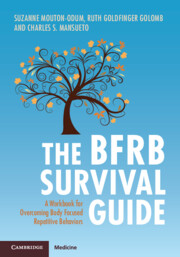Book contents
- Frontmatter
- Dedication
- Contents
- Part I Preparation, Gaining Perspective, and Heightening Awareness of Your BFRB
- Part II Interventions and Skill Building: Selecting and Using Interventions
- 4 The Sensory Domain
- 5 The Cognitive Domain
- 6 The Affective Domain
- 7 The Motor Domain
- 8 The Place Domain
- Part III Lifestyle Changes and Maintenance of Recovery
- References
- Index
5 - The Cognitive Domain
from Part II - Interventions and Skill Building: Selecting and Using Interventions
Published online by Cambridge University Press: 26 May 2025
- Frontmatter
- Dedication
- Contents
- Part I Preparation, Gaining Perspective, and Heightening Awareness of Your BFRB
- Part II Interventions and Skill Building: Selecting and Using Interventions
- 4 The Sensory Domain
- 5 The Cognitive Domain
- 6 The Affective Domain
- 7 The Motor Domain
- 8 The Place Domain
- Part III Lifestyle Changes and Maintenance of Recovery
- References
- Index
Summary
This chapter reviews an array of cognitions (thoughts and beliefs) that can be very helpful or unhelpful for those struggling with a BFRB. First, we review different types of thoughts that encourage BFRB activity, as well as describe ways to challenge them. Next, we discuss perfectionistic thoughts and beliefs and review the importance of embracing one’s flaws and vulnerabilities, instead of desperately attempting to hide them. Finally, we talk about cognitive flexibility and learning the value of accepting urges as they arise, allowing them to diminish on their own.
Keywords
Information
- Type
- Chapter
- Information
- The BFRB Survival GuideA Workbook for Overcoming Body Focused Repetitive Behaviors, pp. 111 - 126Publisher: Cambridge University PressPrint publication year: 2025
